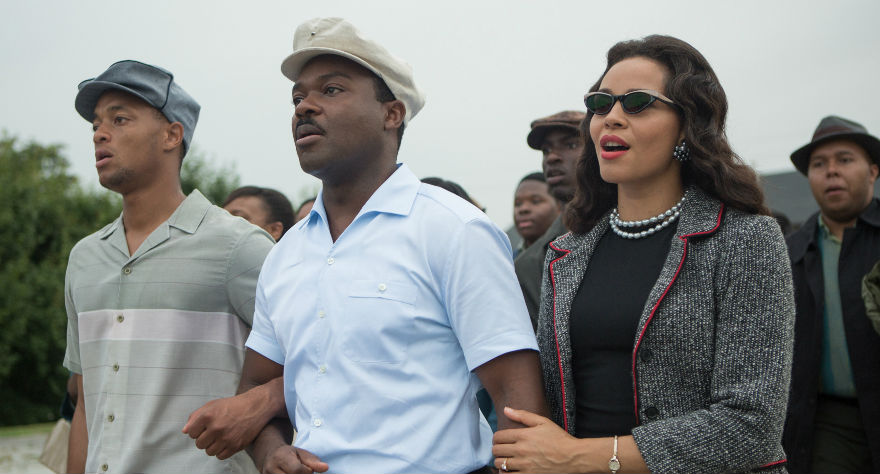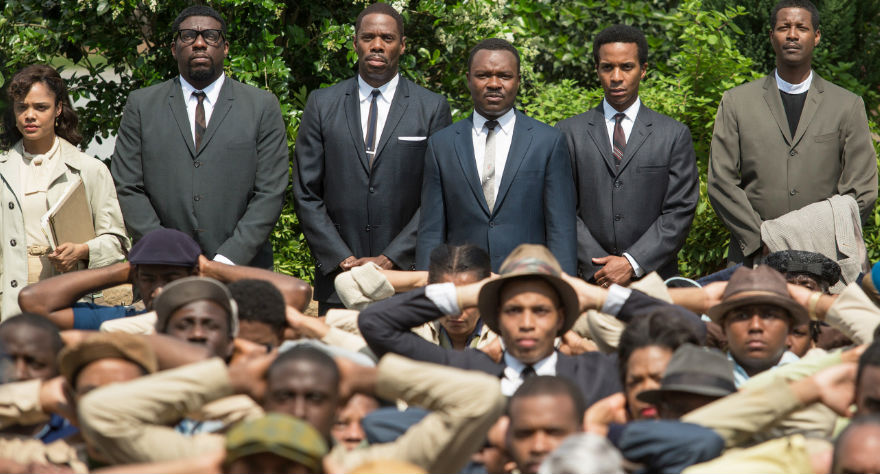
In DuVernay's grounded character portrait, MLK ain't no saint.

In DuVernay's grounded character portrait, MLK ain't no saint.
Ava DuVernay’s Selma, about Martin Luther King Jr.’s organization of three marches from Selma to Montgomery, Alabama in 1965 (protests that led to the Voting Rights Act), was produced for about $20 million. The film was privately funded (it was picked up for distribution by Paramount following completion) and that meant DuVernay had artistic autonomy, but it also meant that she didn’t have the dough to buy the rights to King’s famous speeches. For those expecting Selma to be a biopic about a legendary leader (it’s not), this may seem like a critical omission, but the absence of the speeches ends up being one of the film’s biggest boons; this is a story not about a great man’s famous sound bites, but about a flawed man, the burdens of greatness, and the scars they left on his mind, body, and heart.
Selma‘s a focused film that covers a pivotal moment in American history (about 90 days), with no flashbacks to King’s upbringing or the march on Washington. The story’s concern is Selma, and what King did there. The pertinence of the film to the issues of today is undeniable, and is most evident in its most horrific sequence, in which we’re shown the gory results of the March 7, 1965 march. The march ends in a sickening bloodbath as we see white police officers savagely brutalize King’s protesters without mercy. While the imagery is rightly appalling and explicit, it isn’t the most disturbing thing about the film: What’s most disturbing about Selma is how relevant today, in 2015, in light of current events, the image of a white “protector” murdering an unarmed black man is. It’s been 50 years. That’s the most disturbing thing. It’s not the most interesting thing about the film, though.
What’s most interesting is that the film is a human history lesson, not a mythical one. Prolific English actor David Oyelowo takes a more grounded, sensible approach to playing King than anyone could have expected. His King is a man of intense focus and imperfect ego. Jealous. Neglectful. You expect him to channel the commanding presence and oratory prowess of King, and to be sure, on that front he delivers: He makes the speakers rumble when on the podium or pulpit, mobilizing large crowds to take a stand. It’s thrilling to watch, and he sounds just like King, and it’s all very, very impressive. But the real key to Oyelowo’s performance is when his mouth is shut; that’s when you’ll quiver.
The best scene is an uncomfortable domestic impasse. After listening to a surveillance recording that’s supposed evidence of her husband’s infidelity, Coretta King (a strong Carmen Ejogo) launches a low, slow, burning set of yes-or-no questions at King (concerning his mistresses), who looks puny sitting in a chair as she towers over him. Having Coretta impose her will by commanding her husband, one of the greatest speakers in history, to answer yes-or-no questions, is brilliant. He looks weak, and bruised. In a later scene, Coretta visits King while he’s behind bars after being arrested following a public protest. She mentions that she’s met with Malcolm X, who’s willing to give King his support. He’s hurt upon learning his wife met with his rival, and even dares to suggest that she’s infatuated. It’s these moments of sheer vulnerability, off the front lines, that honor King’s life like no history book or documentary ever could. It’s a thoughtful perspective. To truly appreciate his accomplishments, we must remember that King breathed and bled and hurt like all of us, and yet still did all the things he did. He was strong, not invincible.

In the film’s first incarnation, which was written by Paul Webb and was to be directed by Lee Daniels (who eventually passed the project up to do The Butler), the story centered heavily on King’s negotiations with President Lyndon B. Johnson. When DuVernay was brought on to direct in 2013, however, she revised the script (with Webb, who stayed on as penner), shifting its focus significantly, concentrating more on King’s organizing in Selma. LBJ is still in the movie (Tom Wilkinson plays him very well), but his presence is limited and is clearly de-emphasized from the original script. DuVernay makes it crystal clear that the President is no white savior (he’s mostly utilized as a force of opposition), though the film has come under criticism for allegedly misrepresenting LBJ’s level of cooperation with King on the Voting Rights Act.
Also in the film as government officials are Tim Roth, as AL Gov. George Wallace, and Dylan Baker, as J. Edgar Hoover. Their malevolence feels largely overplayed, and though Roth’s turns as weaselly heels are always fun, he and Baker (who’s not nearly as good) feel like they’re in a separate film. Oprah Winfrey, Common, Martin Sheen, and Cuba Gooding Jr. also play supporting roles, with Winfrey making the biggest impression as a Annie Lee Cooper, a woman fighting tooth and nail for her right to vote as an American citizen (she was also a producer on the film).
Selma is a phenomenal movie when it operates as a character study, showing us King having one-on-one conversations with different people around him, revealing layers of his personality in a nuanced, elegant way. When the film zooms out however, as in the big marching scenes or the handful of times King takes the pulpit, the film loosens its grip and becomes a less rich, less grounded affair. Whiffs of “prestige picture” arise now and again (especially near the film’s close), but Oyelowo does all he can to maintain the film’s sense of immediacy. There’s an emphasis on chronicling King’s perceptive maneuverings and strategies when orchestrating the marches, but these sections ultimately feel like detours on the more compelling, emotional journey of getting to know the man behind the scenes.
Like I mentioned earlier, we hear none of the famous speeches. DuVernay wrote new speeches in their stead, and remarkably, they sound 100% in accordance with King’s voice and philosophy. (To be fair, I’m no MLK historian, but for what it’s worth it was totally believable to me that he wrote these things.) Because they’re tailor-made, the new lectures and sermons fit into the film’s larger narrative much better than the original speeches would have, and in fact, had the original speeches made it in, they probably would have pushed the film into the realm of hagiography in earnest.
DuVernay proves that she’s a terrific director, especially when it comes to collaborating with her actors. Oyelowo, a young veteran, has his proudest outing as an actor here, and we miss him every moment he’s not on-screen. Like Steve McQueen’s 12 Years a Slave, Selma‘s cultural significance is critical and will inevitably permeate all conversations about the film. As a reviewer, I must stress that its cinematic value speaks for itself, even when you swipe away the context of today’s struggles.